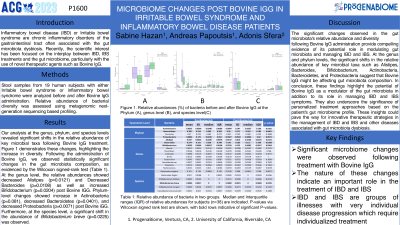Monday Poster Session
Category: Colon
P1600 - Microbiome Changes Post Bovine IGG in Irritable Bowel Syndrome and Inflammatory Bowel Disease Patients
Monday, October 23, 2023
10:30 AM - 4:15 PM PT
Location: Exhibit Hall

Has Audio

Sabine Hazan, MD
ProgenaBiome
Ventura, California
Presenting Author(s)
Sabine Hazan, MD1, Andreas Papousis, PhD1, Adonis Sfera, MD2
1ProgenaBiome, Ventura, CA; 2University of Southern California Riverside, Riverside, CA
Introduction: Inflammatory bowel disease (IBD) or Irritable bowel syndrome are chronic inflammatory disorders of the gastrointestinal tract often associated with the gut microbiota dysbiosis. Recently, the scientific interest has been focused on the interplay between IBD, IBS treatments and the gut microbiome, particularly with the use of novel therapeutic agents such as Bovine lgG.
Methods: Stool samples from 19 human subjects with either Irritable bowel syndrome or inflammatory bowel syndrome were analyzed before and after Bovine lgG administration. Relative abundance of bacterial diversity was assessed using metagenomic next-generation sequencing based profiling.
Results: Our analysis at the genus, phylum, and species levels revealed significant shifts in the relative abundance of key microbial taxa following Bovine lgG treatment. Figure 1 demonstrates these changes, highlighting the increase in diversity. Following the administration of Bovine lgG, we observed statistically significant changes in the gut microbiota composition, as evidenced by the Wilcoxon signed-rank test (Table 1). At the genus level, the relative abundances showed decreased Alistipes (p=0.0121) and Decreased Bacteroides (p=0.0108) as well as increased Bifidobacterium (p=0.0204) post Bovine IGG. Phylum-level changes showed increase in Actinobacteria (p=0.081), decreased Bacteroidetes (p=0.0401), and decreased Proteobacteria (p=0.0071) post Bovine iGG. Furthermore, at the species level, a significant shift in the abundance of Bifidobacterium breve (p=0.0225) was observed.
Discussion: The significant changes observed in the gut microbiota's relative abundance and diversity following Bovine lgG administration provide compelling evidence of its potential role in modulating gut microbiota and managing IBD and IBS.
At the genus and phylum levels, the significant shifts in the relative abundance of key microbial taxa such as Alistipes, Bacteroides, Bifidobacterium, Actinobacteria, Bacteroidetes, and Proteobacteria suggest that Bovine lgG might be affecting gut microbiota composition.
In conclusion, these findings highlight the potential of Bovine lgG as a modulator of the gut microbiota in addition to its role in managing IBD and IBS symptoms. They also underscore the significance of personalized treatment approaches based on the patient's gut microbiome profile. These insights could pave the way for innovative therapeutic strategies in the management of IBD and IBS and other diseases associated with gut microbiota dysbiosis.

Disclosures:
Sabine Hazan, MD1, Andreas Papousis, PhD1, Adonis Sfera, MD2. P1600 - Microbiome Changes Post Bovine IGG in Irritable Bowel Syndrome and Inflammatory Bowel Disease Patients, ACG 2023 Annual Scientific Meeting Abstracts. Vancouver, BC, Canada: American College of Gastroenterology.
1ProgenaBiome, Ventura, CA; 2University of Southern California Riverside, Riverside, CA
Introduction: Inflammatory bowel disease (IBD) or Irritable bowel syndrome are chronic inflammatory disorders of the gastrointestinal tract often associated with the gut microbiota dysbiosis. Recently, the scientific interest has been focused on the interplay between IBD, IBS treatments and the gut microbiome, particularly with the use of novel therapeutic agents such as Bovine lgG.
Methods: Stool samples from 19 human subjects with either Irritable bowel syndrome or inflammatory bowel syndrome were analyzed before and after Bovine lgG administration. Relative abundance of bacterial diversity was assessed using metagenomic next-generation sequencing based profiling.
Results: Our analysis at the genus, phylum, and species levels revealed significant shifts in the relative abundance of key microbial taxa following Bovine lgG treatment. Figure 1 demonstrates these changes, highlighting the increase in diversity
Discussion: The significant changes observed in the gut microbiota's relative abundance and diversity following Bovine lgG administration provide compelling evidence of its potential role in modulating gut microbiota and managing IBD and IBS.
At the genus and phylum levels, the significant shifts in the relative abundance of key microbial taxa such as Alistipes, Bacteroides, Bifidobacterium, Actinobacteria, Bacteroidetes, and Proteobacteria suggest that Bovine lgG might be affecting gut microbiota composition.
In conclusion, these findings highlight the potential of Bovine lgG as a modulator of the gut microbiota in addition to its role in managing IBD and IBS symptoms. They also underscore the significance of personalized treatment approaches based on the patient's gut microbiome profile. These insights could pave the way for innovative therapeutic strategies in the management of IBD and IBS and other diseases associated with gut microbiota dysbiosis.

Figure: Figure 1. Relative abundances (%) of bacteria before and after Bovine lgG at the Phylum (A), genus level (B), and species level(C)
Disclosures:
Sabine Hazan indicated no relevant financial relationships.
Andreas Papousis indicated no relevant financial relationships.
Adonis Sfera indicated no relevant financial relationships.
Sabine Hazan, MD1, Andreas Papousis, PhD1, Adonis Sfera, MD2. P1600 - Microbiome Changes Post Bovine IGG in Irritable Bowel Syndrome and Inflammatory Bowel Disease Patients, ACG 2023 Annual Scientific Meeting Abstracts. Vancouver, BC, Canada: American College of Gastroenterology.
